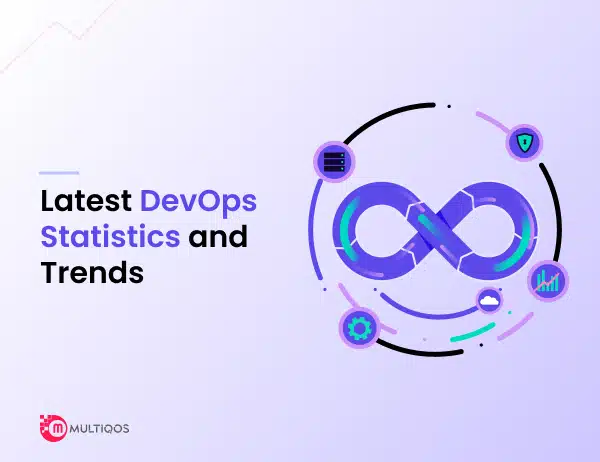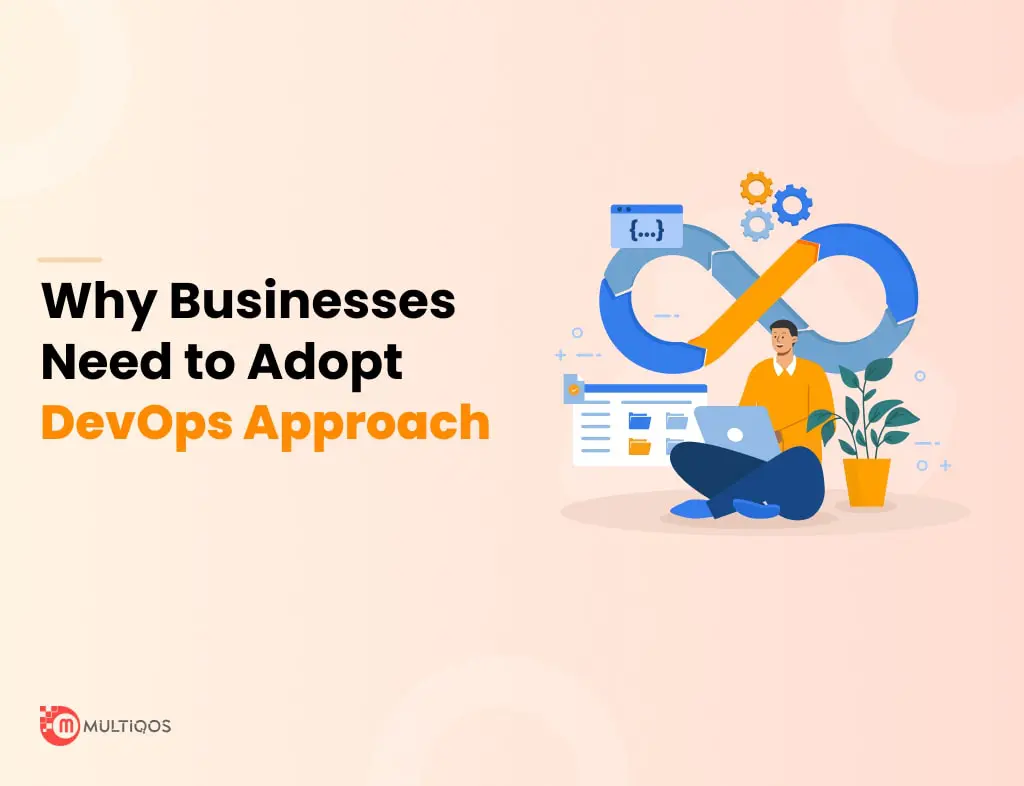Latest DevOps Statistics and Trends to Watch in 2025

Table of Contents:
- Introduction
- An Overview of the Current State of DevOps in 2025
- What is DevOps?
- DevOps Market Statistics
- DevOps Adoption Statistics for 2025
- DevOps CI/CD Statistics
- DevOps Growth Statistics
- DevOps Engineer Statistics
- Roles and Pay Scale of DevOps Developers in 2025
- DevOps Usage Statistics
- DevOps and Key Tools and Statistical Analysis
- DevOps Market Growth by Region
- Business DevOps Statistics
- DevOps Benefits Statistics for 2025
- Conclusion
- FAQs
Introduction
Think about it: operations and development; it’s like the engine of a car running in perfect synchronization. It is not a dream at all; this is the reality of what DevOps can achieve at its best and through full automation.
In order to start the process of DevOps 2025, information on the trends and statistics of the field has become crucial. With these ideas, companies are able to transform and adapt better in the contemporary world through the application of new technologies.
These days there are numerous DevOps stats indicating positive improvements in organizations’ software development life cycle, whereby the application of new tools and practices, organizations can increase today’s time-to-market and develop high-quality applications that meet the needs of their customers.
In this blog, we will explore more insights into the DevOps market, its statistics, and trends. This will help you be informed and on the lookout in your business.
An Overview of the Current State of DevOps Statistics in 2025
DevOps has come a long way since its start, and currently, it is more famous than before. Therefore, DevOps fixes the main issues like disparate information, technology estrangement, and organizational performance since it concentrates on eradicating divisions between development and operations.
Because of these advantages, many companies are adopting DevOps solutions to improve their productivity, accelerate project delivery, and achieve better results. A recent study by Markets and Markets shows how big DevOps is going to be.
The research predicts that the DevOps market will reach $25.5 billion by 2028, growing at 19.7% per year between 2025 and 2028. This sharp increase is indicative of how much organizations now embrace the DevOps in the tech sector as a spearhead for excellence and creativity.
Before diving straight into the numerous current trends and the numbers from 2025, let us see what DevOps is all about and why it became such an essential aspect of the modern software development landscape.
What is DevOps?
Technically, ‘DevOps’ is an acronym that is derived from the union of two words, ‘Development‘ and ‘Operations’. In simple and clear terms, DevOps is a best practice that aims at cultivating a structure that facilitates and encourages better management of processes that involve designing, producing, and delivering applications.
In the past, development, IT operations, and quality engineering and security teams, for instance, were developed separately. DevOps does this by encouraging these teams to effectively blend together.
In truth, it is not about using tools, but a type of culture that can greatly enhance the flow of information and coordination within the company. By adopting DevOps, enterprises can boost the competencies required, and integrating such individuals as DevOps engineers is helpful.
DevOps Market Statistics
DevOps market size in 2023 was valued at $10.4 billion, and it is poised for fast growth over the coming few years. From 2025 to 2028, the market is expected to grow at a compound annual growth rate (CAGR) of 19.7%, driven by increasing demand to shorten software development cycles and speed of delivery.
The on-premise DevOps market is also expected to experience tremendous growth, with estimates suggesting it could reach $45 billion by 2032. Much of this growth is due to growing concerns about data privacy for cloud environments in the United States, which is prompting more companies to choose to provide on-site solutions.
Overall, the global DevOps market is on track to reach $25.5 billion by 2028, nearly twice as large as it was in 2023.
DevOps Adoption Statistics for 2025
The market is vast and only expands year on year, with the DevOps industry constantly shifting in response to the market.
A survey conducted by Gartner shows that, in order, over 85% of organizations will be cloud-first by 2025. Here are the major DevOps adoption trends in the year 2025:
- Reduced Support Time: This is due to the fact that DevOps techniques assist companies to reduce the number of days their IT team spends on managing support cases by 60%. This is a good thing for any firm that wants to optimize in 2025 and cut costs.
- Increased Focus on Infrastructure: DevOps can also free up 33% more time for application development and enhance infrastructure by allowing it to be optimized for its performance.
- Platform Engineering Success: Amazingly, 94% of businesses think that platform engineering proves useful in maximizing on the DevOps gains, thus making it a key determinant for success in 2025.
These statistics explain how technology is revolutionizing the operation of businesses and their achievement of goals. As for the organizations at the forefront of implementing this methodology, their future appears to be rather promising.
DevOps CI/CD Statistics
The CI/CD pipeline consists of automated processes that are triggered whenever there are changes to a company’s technology stack. These pipelines are key to facilitating development and deployment.
Let’s take a look at some important considerations related to DevOps CI/CD.
- The global market for continuous integration (CI) applications would be valued at about $970.52 million by 2022.
- This market is expected to grow significantly, reaching about $4.38 billion by 2031, at a compound annual growth rate (CAGR) of 18.22% from 2023 to 2031. While companies continue to demand high performance from their DevOps teams, the demand for CI tools continues to grow.
- By 2021, the CI tools market was valued at USD 802.2 million and is expected to grow to USD 3.76 billion by 2030, at a CAGR of 18.74%. This growth reflects the increasing importance of CI/CD practices in contemporary software development.
DevOps Growth Statistics
The DevOps market is experiencing constant growth; projections indicate that it could grow to USD 10.4 billion in 2023 to an incredible USD 25.5 billion by 2028.
According to the Global Newswire, the growth of the markets is estimated to be USD 12,215.54 million by 2026, with a CAGR of 18.95% for the period 2020-2026.
These numbers reflect how quickly DevOps is growing across industries in such a short period. The factors behind such an increase cannot be doubted. The statistics obtained from Google reveal that 86% of firms understand the significance of implementing new software efficiently, with DevOps being seen as a solution to this issue by these organizations.
Any business that can quickly get digital products into the market has a strong edge over the others; this is why DevOps is becoming a significant method in the current competitive world.
DevOps Engineer Statistics
- There is great demand for DevOps engineers, and now more than 11029 engineers are working in the United States.
- The most common ethnicity of DevOps engineers is White (56.0%), accompanied by Asian (28.7%) and Hispanic or Latino (7.2%).
- 16.1% of DevOps engineers are girls, while 75.7% are men. In 2021, women earned ninety-three% of what guys earned.
- The average age of a hired DevOps engineer is 39 years old.
Roles and Pay Scale of DevOps Developers in 2025
As for the definition of DevOps engineers, it concerns professionals who are to guarantee the IT infrastructure’s fluent functionality, combining development and operation.
The common annual income for DevOps engineers in the USA is $103,571, with the top 10% earning $134,000 or extra.
The majority of DevOps engineers are positioned in GA, Atlanta, NY, and New York, with New York being the most in-demand city.
Some of them are involved with website releases, infrastructure support, system operations, security, and DevOps initiative support.
Currently, 13 percent of jobs are open to DevOps engineers. Of women respondents, 8% and 86%. Only 2% are male, which is a sign that guys need to get into this line of work too.
Additionally, there is a growing demand for DevOps engineers due to its industry growth, thus expanding career options for anyone interested in technology and teamwork.
DevOps Usage Statistics
In the survey conducted, 99% of respondents confirmed that the DevOps model had a positive impact on their organization. Furthermore, 78% stated that owing to DevOps they had to study, while 48% said that mastering DevOps facilitated salary increases.
Here are a few more key stats on DevOps usage:
- Among the interviewed people, 61% of them highlighted the fact that DevOps helped them deliver better quality products.
- 49% pointed towards the fact that it enhanced the versatility of experimenting with different releases.
- Three out of 100 participants doubted that DevOps benefited their organization.
These numbers underscore that DevOps is not a fad but a strong process that is redefining the dynamics of business.
DevOps and Key Tools and Statistical Analysis
- GitHub: The DevOps market size has been estimated to reach $10.9 billion in 2023 and is poised to reach $63.4 billion in the future financial year. This growth underlines the increasing use of the DevOps method, into which GitHub has been playing a significant role.
- Docker: Docker, which currently has 50% of the market share, is undoubtedly the most popular container platform and is so significant in the world of containerization.
- AI/ML: According to a survey done by the State of DevOps report, businesses that use machine learning (ML) in conjunction with DevOps adoption for testing and automation enjoy up to a 45% higher chance of successful execution of change. This demonstrates how the integration of AI/ML can help to work faster and achieve the goals set without making a mistake.
- Cloud-Native Technologies: A staggering 70% of new applications are now being built with cloud-native technology and are actively using key providers, namely AWS, Azure, and Google Cloud.
- Kubernetes: Currently, Kubernetes prevails as the leading container orchestration solution, and about 48% of organizations that adopted containers use Kubernetes as the solution for managing their deployments.
- Jenkins: From June 2021 to June 2023, customers using Jenkins Pipeline increased by 79% as compared to the total 45% overall growth in workload that ran on the Jenkins platform in the same duration.
DevOps Market Growth by Region
DevOps is experiencing significant regional growth, with notable growth trends:
- Europe: The DevOps market in Europe grew at an annual rate of 17.1% from 2017 to 2023, indicating strong uptake in the region.
- Asia Pacific: The Asia Pacific region is rapidly adopting DevOps, especially among startups and small and medium-sized businesses. The market here is expected to grow by 25% by 2028. By 2021, Asia Pacific was the fastest-growing DevOps market, growing at 20.2%, resulting in improvements digitally in sectors such as banks.
- Middle East and Africa: The DevOps market in the Middle East and Africa is expected to grow at an annual rate of 14.2% from 2023 to 2030. This growth is driven by the challenges of the region in the face of digital transformation and the need for rapid software development.
Business DevOps Statistics
Currently, more than 400 companies within the USA have adopted the DevOps approach for their startup initiatives. The growth of DevOps adoption is expected to have a considerably high CAGR of 17.7% from 2021 and 2026.
But it is important to note that DevOps is an efficient solution, which makes infrastructure costs approximately 30% less costly than the more conventional solutions and reduces the time spent on a range of tasks by 60%.
This is the cost-saving solution sought after by most startups seeking to optimize their operations.
According to Statista, 47% of SMBs incorporate DevOps tools into their processes. DevOps brings progressive benefits to SMBs in various aspects, such as velocity improvement, integrated security, automation, and deconstruction of operational silos.
Furthermore, the finding of the present surveys of Techaisle suggests that around 34% of SMBs appreciate DevOps for its capacity to achieve business objectives, acknowledge competitive edges, and facilitate efficient IT and business frameworks.
Another way huge companies depend on DevOps is to improve their products and services. Many large organizations, such as Amazon, Netflix, Walmart, and Adobe, have adopted DevOps in their respective enterprises to deliver optimal value.
To be specific, the survey shows that 22% of large organizations adopt DevOps for augmenting security through automation.
DevOps Benefits Statistics for 2025
The benefits of adopting DevOps are coming out in the open now. Here’s a look at some key statistics that illustrate these benefits:
- Positive Outcomes: Current studies indicate that up to 99% of organizations that have embraced DevOps have recorded positive outcomes from the practices, hence high satisfaction.
- Enhanced Quality: About 61% of organizations have reported an increase in the quality of products that are developed due to the efficient approaches supported by DevOps.
- Boosted Efficiency: Firms with a DevOps culture invest 33% more time in improving the infrastructure, which results in better systems and rapid deployment.
- Faster Releases: DevOps has aided 49% of establishments in getting faster cycle times of delivery, hence allowing them to meet market needs more efficiently.
- Skill Growth: It can be said that continuous learning as a strategy utilized by 68% of IT teams for upskilling is effectively tackling the skills deficit in DevOps and DevSecOps.
These statistics demonstrate how DevOps disrupts the way of thinking in software development and IT operations, effectively being a valuable strategy for companies that desire innovation and competitiveness in the current and upcoming years.
Conclusion
Statistical data on DevOps trends reveal that not only those companies that have been adopting DevOps are learning faster but also perform better. Looking at the year 2025 and beyond, DevOps is expected to grow with an increased pace, offering more gains to organizations.
Based on productivity and automation, DevOps help businesses to create new values and improve organizational performance. As for those seeking to attain the ultimate realization of what DevOps is capable of, MultiQoS provides consultancy.
MultiQoS is a DevOps development company and is committed to using DevOps practices to provide continuous software delivery while improving collaboration across teams.
If you are ready to begin your DevOps journey, it is time to get acquainted with MultiQoS and discover the benefits of working with a company that has expertise in this field.
FAQs
The market of DevOps is expected to grow even more, and especially the market estimations reveal that the market can rise up to approximately $63. 4 billion by 2032. These are particular strengths that increase with the use of DevOps practices in various industries around the world.
Trends include using generative AI in AIOps, increasing the data quality uptick of AI, the focus on Data and Model Operations, and increasing the system reliability with the integration of SRE.
Some of the factors that are forcing organizations to embrace DevOps include need for faster time to deliver the software, need for better communication between the development and operations functions and a need to adopt the cloud.
In the financial segment, depending on the healthcare and retail framework, DevOps is used to make security more appropriate; it is used to follow with the regulatory policies to make new features and innovations that are needed as a result of changing market situations.
The concern follows the principles of DevOps and there is an increasing demand in various professionals related to the field. First of all, there is always a talent shortage, particularly, in automation, cloud infrastructure, and CI/CD pipeline.
Get In Touch






